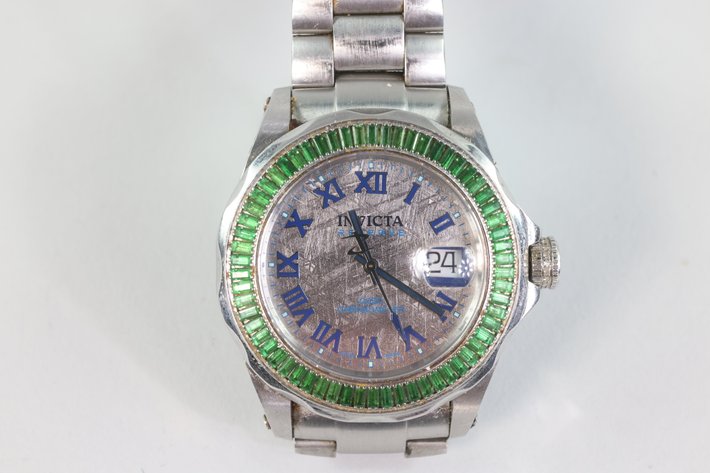
Blue Box Auction Gallery is making its journey into the world of cryptocurrency by accepting Ethererum (ETH), the currency of the Ethereum network, Bitcoin (BTC) & other major coins. This will allow our bidders to be given more financial flexibility in choosing how they choose to pay for their winning bids.
While buying and selling cryptos is becoming increasingly mainstream, the opportunities to spend virtual currencies are somewhat limited in comparison due to its volatility. Blue Box will allow our customers to convert these digital assets into treasures that we offer at auction.
A number of auction houses have begun welcoming cryptocurrencies for big-ticket items, which have included paintings and NFTs -- the blockchain-backed tokens increasingly used to transfer ownership of digital artworks and collectibles.
In the future, it’s important for us to be flexible in the way our clients can pay us, and [cryptocurrency] could initiate payment to the seller quicker because of the ease of moving cryptocurrency around.
Explanation on Bitcoin & Digital Currency For Our Customers
Bitcoin is a virtual currency that blossomed in the public consciousness after its price-per-coin rose above $13,000 in early 2018. Cryptocurrency forced a complex intersection of the privacy policy, banking regulation, and technological innovation.
Cryptocurrencies are just lines of computer code that hold monetary value. Those lines of code are created by electricity and high-performance computers. Cryptocurrency is also known as a digital currency. Either way, it is a form of digital public money that is created by painstaking mathematical computations and policed by millions of computer users called miners. Physically, there is nothing to hold although you can exchange crypto for cash.
Crypto comes from the word cryptography, the security process used to protect transactions that send the lines of code for purchases. Cryptography also controls the creation of new coins, the term used to describe specific amounts of code. Hundreds of coin types now dot the crypto markets; only a handful have the potential to become a viable investment.
Governments have no control over the creation of cryptocurrencies, which is what initially made them so popular. Most cryptocurrencies begin with a market cap in mind, which means that their production will decrease over time thus, ideally, making any particular coin more valuable in the future.
What Are Bitcoins?
Bitcoin was the first popular crypto. No one knows exactly who created it — most cryptocurrencies are designed for maximum anonymity — but bitcoins first appeared in 2009 from a developer supposedly named Satoshi Nakamoto. He has since disappeared and left behind a Bitcoin fortune. Bitcoin was the first major cryptocurrency, all digital currencies created since then are called altcoins, or alternative coins. Litecoin, Ethereum, and hundreds of other coins are all altcoins because they are not bitcoin.
One of the advantages of crypto is that it can be stored offline on a person's local hardware. That process is called cold storage and it protects the currency from being taken by others. When the currency is stored on the Internet somewhere (hot storage), there is a high risk of it being stolen.
On the flip side, if a person loses access to the hardware that contains the bitcoins, the currency is simply gone forever. It's estimated that as much as $30 billion in bitcoins have been lost or misplaced by miners and investors.
Why Bitcoins Are So Controversial
Various recent events turned bitcoin into a media sensation.
From 2011-2013, criminal traders made bitcoins famous by buying them in batches of millions of dollars so they could move money outside of the eyes of law enforcement. Subsequently, the value of bitcoins skyrocketed. Scams, too, are very real in the cryptocurrency world. Naive and savvy investors alike can lose hundreds or thousands of dollars to scams.
Ultimately, though, bitcoins and altcoins are controversial because they take the power of issuing money away from central banks and give it to the general public. Bitcoin accounts cannot be frozen or examined by tax inspectors, and middleman banks are completely unnecessary for bitcoins to move. Law enforcement officials and bankers see bitcoins as "gold nuggets in the wild, wild west," beyond the control of police and financial institutions.
How Bitcoins Work
Bitcoins are completely virtual coins designed to be self-contained for their value, with no need for banks to move and store the money. Once you own bitcoins, they behave like physical gold coins: They possess value and trade just as if they were nuggets of gold in your pocket. You can use your bitcoins to purchase goods and services online, or you can tuck them away and hope that their value increases over the years. Bitcoins are traded from one personal wallet to another.
A wallet is a small personal database that you store on your computer drive (i.e cold storage), on your smartphone, on your tablet, or somewhere in the cloud (hot storage). Bitcoins are forgery-resistant. It is so computationally intensive to create a bitcoin, it isn't financially worth it for counterfeiters to manipulate the system.
Bitcoin Values and Regulations
A single bitcoin varies in value daily; check places like Coindesk to check current par rates. There is more than $2 billion dollars worth of bitcoins in existence. Bitcoins will stop being created when the total number reaches 21 billion coins, which will be sometime around the year 2040. As of 2017, more than half of those bitcoins had been created.
Bitcoin currency is completely unregulated and completely decentralized. There is no national bank or national mint, and there is no depositor insurance coverage. The currency itself is self-contained and un-collateral, meaning that there is no precious metal behind the bitcoins; the value of each bitcoin resides within each bitcoin itself.
Bitcoins are stewarded by miners, the massive network of people who contribute their personal computers to the bitcoin network. Miners act as a swarm of ledger keepers and auditors for bitcoin transactions. Miners are paid for their accounting work by earning new bitcoins for each week they contribute to the network.
How Bitcoins Are Tracked
A bitcoin holds a very simple data ledger file called a blockchain. Each blockchain is unique to each individual user and his or her personal Bitcoin wallet.
All bitcoin transactions are logged and made available in a public ledger, helping ensure their authenticity and preventing fraud. This process helps to prevent transactions from being duplicated and people from copying bitcoins.
While every bitcoin records the digital address of every wallet it touches, the bitcoin system does not record the names of the people who own wallets. In practical terms, this means that every bitcoin transaction is digitally confirmed but is completely anonymous at the same time. So, although people cannot easily see your personal identity, they can see the history of your bitcoin wallet. This is a good thing, as public history adds transparency and security, and helps deter people from using bitcoins for dubious or illegal purposes.
Why Bitcoins Are Such a Big Deal
Bitcoins completely bypass banks. Bitcoins are transferred through a peer-to-peer network between individuals, with no middleman bank to take a slice.
Bitcoin wallets cannot be seized or frozen or audited by banks and law enforcement. Bitcoin wallets cannot have spending and withdrawal limits imposed on them. Nobody but the owner of the bitcoin wallet decides how their wealth will be managed. Digital Currency has been called the future of money. Whether that turns out to be true or not; Blue Box Auction Gallery wants to align our goals with the future and this is the first step.













